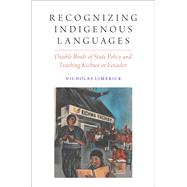Recognizing Indigenous Languages Double Binds of State Policy and Teaching Kichwa in Ecuador
, by Limerick, Nicholas- ISBN: 9780197559178 | 0197559174
- Cover: Hardcover
- Copyright: 10/13/2023
What follows when state institutions name historically oppressed languages as official? What happens when bilingual education activists gain the right to coordinate schooling from upper-level state offices? The intercultural bilingual school system in Ecuador has been one of the most prominent referents of Indigenous education in the Americas. Since its establishment in 1988, members of Ecuador's pueblos and nationalities have coordinated a second national school system that includes the teaching of Indigenous languages. Based on more than two years of ethnographic research in Ecuador's Ministry of Education, at international and national conferences, in workshops, in schools, and with families, Recognizing Indigenous Languages considers how state agents carry out linguistic and educational politics and policies in eras of greater inclusivity and multiculturalism. This book shows how institutional advances for bilingual education and Indigenous languages have been premised on affirming the equality-and the equivalency-of the linguistic and cultural practices of members of Indigenous pueblos and nationalities with other Ecuadorians. Major responsibilities like serving as national state agents, crafting a standardized variety of the Kichwa language family, translating legal documents to Kichwa, and teaching Indigenous languages in schools have provided vast authority, representation, and visibility for those languages and their speakers. However, the everyday work of directing a school system and making Kichwa a language of the state includes double binds that work against the very goals of autonomous schooling and getting people to speak and write Kichwa.






